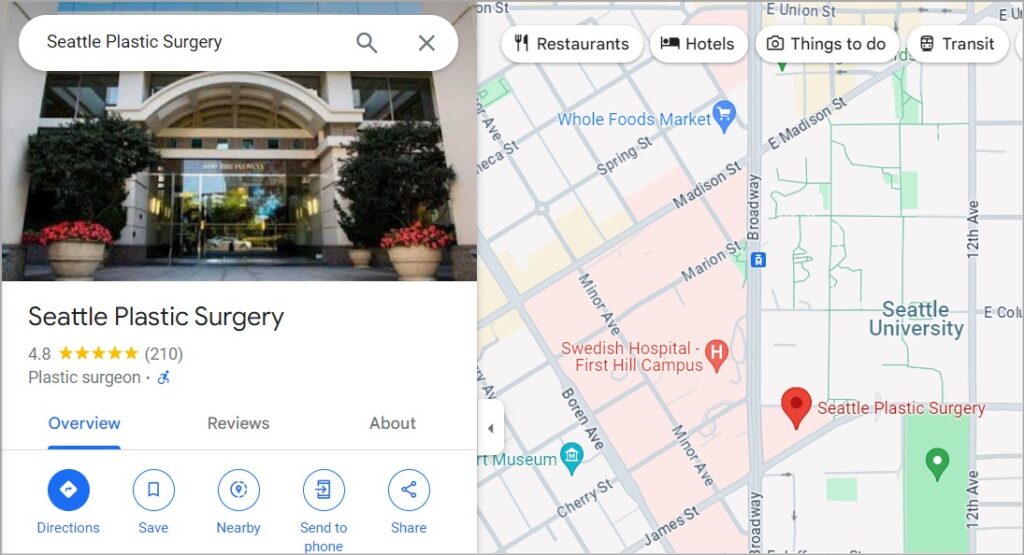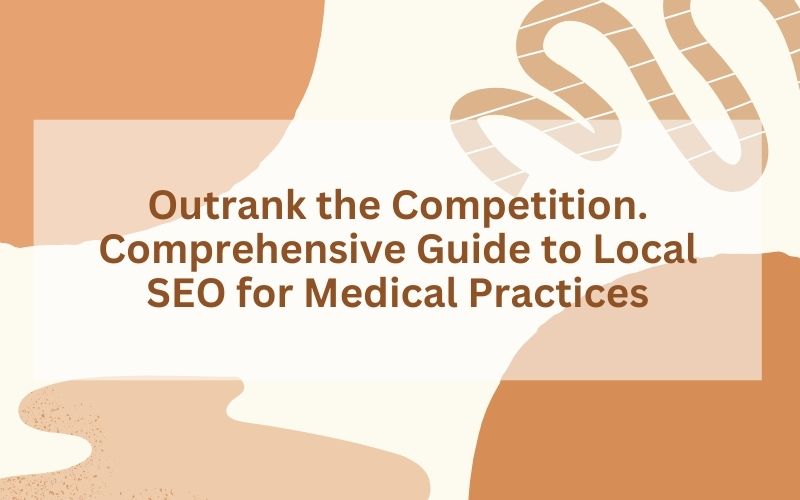Patients are searching online for healthcare providers closer than ever before. To stand out and grow your practice, you need a strong local SEO strategy.
As the healthcare and wellness industry continues to grow, with the global market expected to reach over $7 trillion by 2025, the competition for patients’ attention has never been more fierce. Medical practices that invest in local SEO strategies will gain a significant advantage over their competitors, making it easier for potential patients to discover and choose their services.
Learn about the essential elements of local SEO for healthcare providers, equipping you with the knowledge and tools needed to dominate the local search landscape and drive more qualified leads to your practice.
Understand the Importance of Local SEO for Healthcare Providers
The Rise of Online Healthcare Research
In today’s digital-first world, patients are increasingly relying on online searches to find and research healthcare providers. In fact, studies show that 63% of patients consider a provider’s website when choosing a healthcare professional. This shift in consumer behavior has made it crucial for medical practices to have a strong online presence that can be easily found by those searching for their services.
The Impact of the “YMYL” (Your Money, Your Life) Designation
Healthcare websites are considered part of the “YMYL” (Your Money, Your Life) category in the eyes of Google, which means the content on your website is subject to heightened scrutiny to ensure it provides accurate, trustworthy, and helpful information. This designation underscores the importance of demonstrating expertise, authority, and trustworthiness (E-E-A-T) through your website and online presence.
The Competitive Landscape in the Healthcare Industry
As the healthcare and wellness industry continues to grow, the competition for patients’ attention has become increasingly fierce. Medical practices that invest in local SEO strategies will gain a significant advantage over their competitors, making it easier for potential patients to discover and choose their services.
Optimize Your Website for Local Search
Leveraging Google My Business (GMB) Listings
One of the most critical elements of local SEO for healthcare providers is claiming and optimizing your Google My Business (GMB) listing. This free feature from Google allows you to manage how your practice appears across various Google products, including Maps and Search. A well-optimized GMB listing can help your practice stand out in local search results, providing potential patients with crucial information such as your business name, address, phone number, website, and reviews.

Key Strategies for GMB Optimization:
- Claim and verify your GMB listing
- Ensure all business information is accurate and up-to-date
- Optimize your business description with relevant keywords
- Upload high-quality images and videos to showcase your practice
- Encourage patients to leave reviews and respond to both positive and negative feedback
Enhance Your Website’s Local SEO
While your GMB listing is essential for local visibility, your website also plays a crucial role in your local SEO strategy. Optimizing your website for local search involves a variety of tactics, including:
Optimize Website Content and Structure
- Incorporate location-specific keywords in your website content, including city, state, and service area names
- Ensure your NAP (name, address, phone number) information is consistent across your website and other online listings
- Use schema markup to provide search engines with structured data about your practice, services, and location
- Optimize your website’s title tags, meta descriptions, and header tags to include relevant local keywords
Improve Technical SEO
- Ensure your website is mobile-friendly and fast-loading, as these are crucial factors in Google’s local search rankings
- Address any crawlability or indexability issues that may be hindering your website’s visibility in search results
- Implement structured data, such as schema markup, to help search engines better understand and display your practice’s information
Build Local Backlinks
- Secure listings in local business directories, industry-specific websites, and other authoritative local sources
- Encourage patients to leave reviews on your GMB listing and other reputable review sites
- Collaborate with local organizations, community groups, or influencers to earn high-quality backlinks
Establish Your Practice as a Trusted Authority
Demonstrate Expertise, Authority, and Trustworthiness (E-E-A-T)
As a healthcare provider, it’s essential to establish your practice as a trusted authority in the eyes of both patients and search engines. This is particularly important in the YMYL (Your Money, Your Life) category, where Google places a strong emphasis on the accuracy and reliability of the information provided.
Strategies for Demonstrating E-E-A-T
- Highlight the credentials and expertise of your healthcare providers on your website, including their educational background, certifications, and years of experience
- Showcase patient testimonials and case studies that demonstrate the positive outcomes and experiences your practice has delivered
- Produce high-quality, informative content that showcases your healthcare knowledge and expertise, such as blog posts, videos, and educational resources
- Collaborate with industry publications or respected media outlets to secure guest posts or featured interviews that can boost your practice’s credibility
Leverage Patient Reviews and Testimonials

Online reviews have become a critical factor in patients’ decision-making process when choosing a healthcare provider. By actively encouraging and managing your practice’s online reviews, you can not only improve your local search visibility but also build trust and credibility with potential patients.
Best Practices for Review Management
- Regularly monitor and respond to both positive and negative reviews on platforms like Google, Yelp, and Facebook
- Encourage satisfied patients to leave reviews by providing them with easy-to-use links or prompts
- Address any negative reviews professionally and transparently, demonstrating your commitment to patient satisfaction
- Showcase positive patient testimonials and reviews prominently on your website and social media channels
Optimize for Mobile and Voice Search
The Rise of Mobile and Voice-Driven Healthcare Searches
With the increasing prevalence of mobile devices and the growing popularity of voice-activated assistants, healthcare consumers are now more likely than ever to search for providers on-the-go or through voice commands. This shift in search behavior has significant implications for local SEO strategies in the healthcare industry.
Strategies for Mobile and Voice Search Optimization
- Ensure your website is mobile-friendly and provides a seamless user experience across all devices
- Optimize your website’s loading speed and Core Web Vitals metrics to meet Google’s standards for mobile-friendly sites
- Incorporate natural language and conversational keywords into your content to cater to voice search queries
- Optimize your GMB listing and other local citations to provide accurate, voice-friendly information about your practice
Leverage Local Content and Partnerships
Creating Localized Content and Assets
Beyond optimizing your website and online listings, producing localized content can further enhance your practice’s visibility and authority in your target market. This can include:
- Crafting location-specific blog posts or articles that address the unique healthcare needs and concerns of your local community
- Developing multimedia content, such as videos or podcasts, that showcase your practice’s involvement in local events or initiatives
- Highlighting your practice’s participation in community outreach programs, sponsorships, or partnerships on your website and social media channels
Collaborate with Local Influencers and Organizations
Establishing partnerships with local influencers, healthcare organizations, or community groups can also be a powerful way to boost your practice’s online visibility and credibility. This can include:
- Collaborating with local healthcare bloggers, vloggers, or social media influencers to create co-branded content or cross-promotional campaigns
- Sponsoring or participating in local healthcare-related events, conferences, or workshops
- Joining or becoming an active member of professional associations, industry groups, or local business organizations
Monitor and Adjusting Your Local SEO Strategy
Tracking and Analyzing Key Metrics
Effective local SEO for healthcare providers requires an ongoing, data-driven approach. By regularly monitoring and analyzing key performance indicators (KPIs), you can identify areas for improvement, measure the success of your strategies, and make informed decisions to optimize your local search presence.
Key Metrics to Track:
- GMB performance metrics, such as views, clicks, and customer actions
- Website traffic, including the sources, pages, and user behavior
- Local search rankings for key service-area and location-based keywords
- Online review metrics, including sentiment, response rates, and overall ratings
- Conversion rates, such as appointment bookings or contact form submissions
Continuously Refine and Adapt Your Approach
Local SEO is an ever-evolving landscape, with search engine algorithms and consumer behavior constantly changing. To maintain your competitive edge, it’s essential to regularly review and refine your local SEO strategy, incorporating the latest best practices and adapting to new industry trends.
This may involve:
- Conducting periodic SEO audits to identify areas for improvement
- Staying up-to-date with Google’s algorithm updates and changes to local search ranking factors
- Experimenting with new local SEO tactics and techniques to find the most effective strategies for your practice
- Collaborating with a reputable SEO agency or consultant to leverage their expertise and industry insights
Conclusion
Local SEO has become a crucial component of any successful medical practice’s digital marketing strategy. By optimizing your online presence, demonstrating your expertise and authority, and leveraging the power of local content and partnerships, you can position your practice as the preferred choice for patients in your community.
Remember, local SEO is an ongoing process that requires continuous monitoring, refinement, and adaptation. By staying proactive and embracing the latest best practices, you can unlock the full potential of local search to drive more qualified leads, build trust with your patients, and ultimately, grow your thriving healthcare business.






